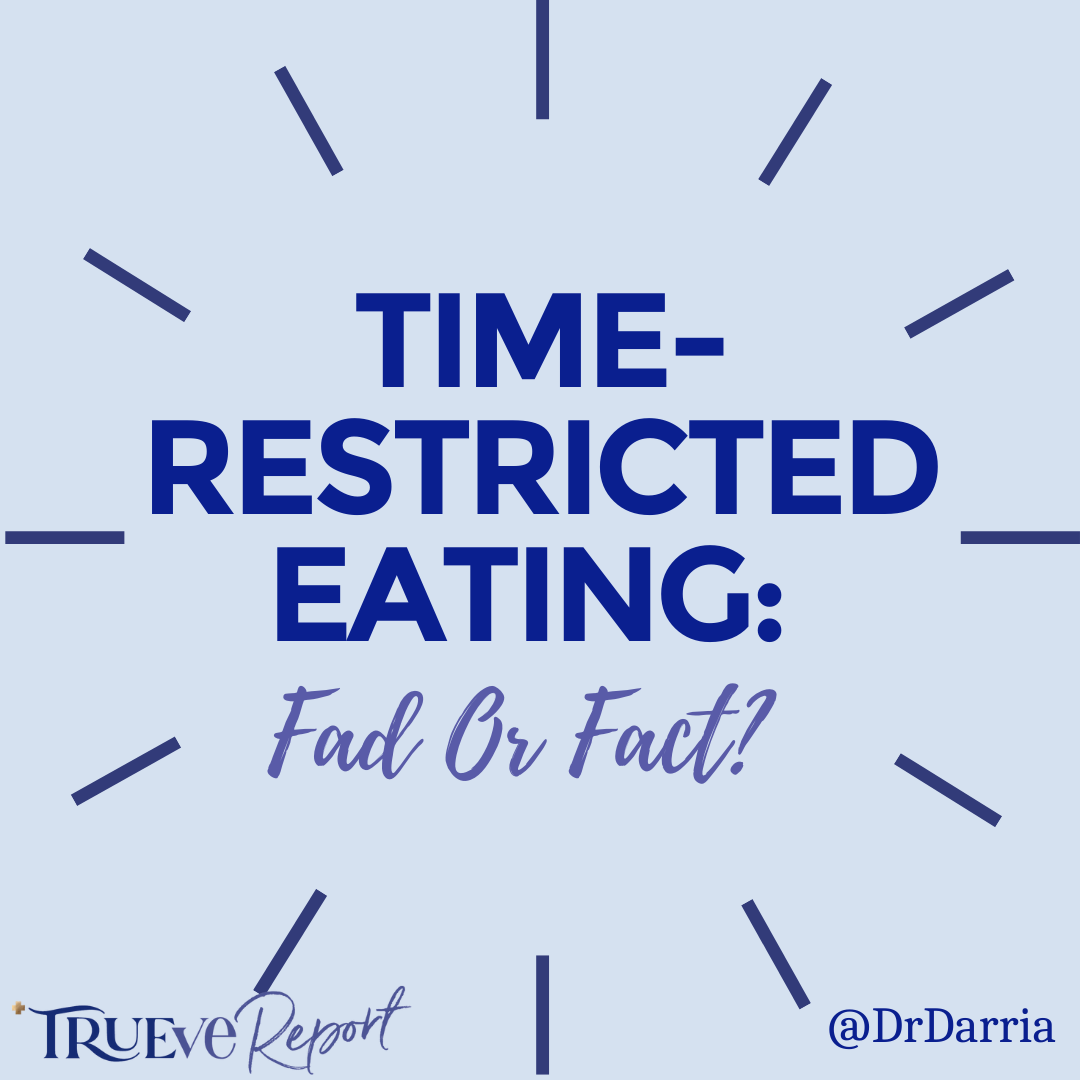Lately, it seems every influencer, carpool mom, or celeb is talking "Time Restricted Eating" (TRE), a modified form of “Intermittent Fasting." But is it legit?
Many of you asked about this – particularly with a headline earlier this year declaring “TRE doesn’t work”. But, with the new year coming, and many of you wanting sustainable healthy options that DON’T add to your stress + burnout, I wanted to share the real evidence.
TL;DR Why TRE is Key for Health + Weight
(read ON below for Full Report)
What is Time-Restricted Eating? TRE is the practice of eating within a certain time window – at the minimum, fasting from between 12 hours (i.e. eating from 7am – 7pm) to 16 hours. See the full report for more extensive fasts, but for the purpose of this report, I’ll be referring to 12-16 hour TRE.
Headlines typically ask the “what’s the ‘best’ diet?” like a head-to-had battle of “Should you do calorie restriction OR TRE?”.
But that’s the wrong question. The right question is: “What approach can I take for my weight / health that is both effective AND sustainable?”
Here’s the thing – TRE is not about WHAT you eat, it’s about WHEN. And the science is pretty clear that WHEN you eat, irrespective of WHAT (which is a different discussion for a different day), matters – for weight – and for a host of other benefits.
Benefits of eating in a restricted (even 12-hour only fast) window:
- Weight loss: while TRE is no “miracle cure” for weight loss, it is a critical component. I.e.: it’s far more difficult to lose weight if you’re eating at all hours. Even if you do not purposefully restrict your calories or diet, eating in a 12-hour window typically leads to about a 3-8% weight loss. It’s not earth-shattering, but similar to of caloric restriction diets (5-10%).
- It’s physiologic. We did not evolve to eat constantly, at all hours. We evolved to have periods of fasting – and our system works best with those cycles.
- It lowers inflammation and may even lower cancer risk. TRE (and fasting in general) triggers autophagy, the process by which our body clears out old cells and generates new ones. This process is linked with lower inflammation, chronic disease risk, and even, potentially, malignancy.
Which is why I follow TRE myself (more on that below), and recommend it for most people (see exceptions here). It’s simple, doesn’t require much mental load, AND it’s how our bodies were wired to eat.
How to start Time Restricted Eating:
- Start easy, fasting for only 12 hours. (ie 7p-7a).
- Longer fasts of 14-16 hours are optimal for benefits, but only if you’re able to sustain them. If not, even going 12 hours will earn benefits.
- If you’re not trying to lose weight, (or just a small amount), it’s ok to relax on weekends if that makes it sustainable. Don’t down a pizza at 2am Saturday night. But it’s ok if dinner is a little later.
- Keep it early:
- Keep your fasting window earlier in the day – eat from 7am – 7pm. I don’t recommend eating after 8pm
- What can you drink while fasting?
- To purists, the answer is water – not even black coffee or tea. However, when you actually dive into the data, the answer is not so …um…black and white. (sorry. pun could not be helped). Caffeine triggers processes to break it down, thus ending the fast. However, (1) it doesn’t have calories and (2) caffeine can actually trigger autophagy. So, if having that cup of coffee is the difference between you being able to do IF successfully or not, have it. You can always go gung-ho after you’re a pro.
- What can you eat to break your fast?
- This is important: opt for high protein, fiber, and good fats. Don’t break your fast with food that will spike your blood sugar, or you’ll trigger just another insulin/glucose cycle, just as you’ve broken it!
- For women, consider your menstrual cycle:
- Some evidence suggests that doing IF (or any diet change) in the week before your menstrual cycle is more challenging due to how your body processes glucose, cravings, and stress during that time. If you have major swings in the week before your period, consider waiting to start IF after your cycle.
For more details (and answering more of your Qs), read on below!
Full Report: Why time restricted eating is key for weight + health
First, some terms.
Definition: What are Time Restricted Eating and Intermittent Fasting?
Time Restricted Eating (TRE) is a form of Intermittent fasting (IF), which is the practice of, well, not eating for periods of time. I’m focusing here one (TRE), which is fasting anywhere from 12 – 16 hours/day (i.e., for 12 hours, you eat from 7am – 7pm, and fast the remaining 12 hours).
There are other longer fasting periods, such as Alternating Day Fasting (for 24 hours every other day), or Modified Fasting (on fasting days, you only eat 20-25% energy needs). But I don’t recommend these as a starting point.
“Does it work? I read an article this summer that said No”.
When a New England Journal of Medicine article came out, headlines shouted “TRE does not work”. But diving into the study: all of the 139 participants lost weight; the TRE group lost about 4 lbs. more than the calorie restriction group, but the difference was not significant, and the authors concluded that TRE was no better than calorie restriction.
But? The study had significant flaws, including that the “Non-TRE” arm also fasted for around 14 hours / day, so it wasn’t a real comparison. I don’t see this study as adding too much to what we already know – this was a case of misconstrued headlines.
Here’s what the evidence actually says.
Why are even short fasts good for us, on a biochemical level?
- It’s a more physiologic way to eat. We did not evolve to eat continuously – particularly continuously of quick-digesting carbs and processed foods, which cause blood sugar spies, elevated insulin, and energy fluctuations. (If you’re wondering how to initiate a bench-clearing brawl amongst nutrition experts, start a debate on the role of insulin on obesity …). We are wired for periods of fasting in line with our Circadian Rhythm. Within 12 hours of fasting, our body’s glycogen (or quick energy stores) are depleted, and our body turns to fats for energy.
- It triggers cell rejuvenation. TRE is what’s referred to as a “hormetic stressor” – much like exercise, sauna use, cold exposure – i.e., mildly stressful activities that trigger cellular rejuvenation, and have been associated with longevity.
Weight loss:
Like any other diet, TRE isn’t a “miracle cure”. It’s not even so much of a diet, but rather a really healthy schedule to eat, at its most basic. In fact, trying to lose weight without some degree of TRE (say 12 hours, 5 days a week) would be far more challenging.
- How much do people lose on TRE? Average weight loss with TRE is typically in the 3- 8% range over 12 weeks, not far from the 5-10% typically reported with calorie restriction. Some studies suggest that TRE may result in greater loss of body fat.
- Why? It’s not entirely due to calories. While some studies show that people on TRE have no reduction in calories, others end up reducing intake (without being asked to). Others show a reduction in sweet and salty snacks (although no difference in sweetened beverages or other processed foods.
Other metabolic benefits:
- Some studies (here and here), although not all, suggest improvement in insulin sensitivity and glucose control, improvements in the leptin/adiponectin ratio, which is related to hunger and fat storage and goes awry in obesity.
- Participants in TRE, show improvements in their cholesterol, triglycerides, blood pressure, and diabetes / insulin resistance. In large part, those improvements are tied to the magnitude of weight lost, as in any other diet.
Does timing of eating matter?
Yes. We evolved to sync eating with our Circadian Rhythm; eating late at night can throw that off.
- Insulin sensitivity fall later in the day, so that meals consumed later at night trigger a greater glucose rise and insulin rise than when eaten earlier.
- A recent small study (16 participants) also showed that eating later in the day caused lower levels of satiety hormones like leptin, lower metabolisms and even genetic changes in fat tissue to promote fat storage.
- Eating earlier decreases overall appetite (via the hormone ghrelin)) and food intake.
- Metabolism also falls during sleep, by 15-30%.
- Gastric (stomach) blood flow and emptying are higher during the day.
I know many TRE proponents skip breakfast and have their meals on the later side. But for the reasons above, I recommend an earlier schedule – or at least finishing eating by 8pm.
Easier for adherence
Adherence to a calorie restricted diet declines after 1-4 months, which is why most people regain significant weight within 1 year.
Now, in extreme, prolonged fasts, dropout rates are higher. However, for a moderate TRE (fasting 12-16 hours), adherence and weight loss maintenance may be easier, simply because it feels less restrictive than cutting calories or food groups.
What other benefits come with Time restricted eating?
The benefits of TRE and intermittent fasting go far beyond the weight effect. In fact, research in the past decade has shown results that are equally – and often far more so – compelling than just weight loss.
- Reduced Inflammation: Inflammatory markers improve, with reductions in IL-6 and TNF-alpha – key regulators of inflammation. Also, for each 3 hour increase in nighttime fast length, HbA1c levels and CRP concentrations are lower.
- Better sleep: Very small studies showed that participants who did TRE improved their sleep and/or felt more rested.
- Microbiome: Some studies in mice show that TRE can also improve the gut microbiome and health.
- Better cell rejuvenation (and possible reduced cancer risk): During the fasting state, our body is better able to perform autophagy, the body’s process of repairing or getting rid of damaged cells and generating new ones. One study in 14 subjects who fasted for 14 hours per day showed improved DNA repair and improved activation of proteins key for reducing cancer risk. Another observational study in breast cancer survivors found that those survivors who fasted 13 hours or more per night, had a 36% lower 7-year risk of recurrence (that last study was observational, but intriguing, as this is a low-risk intervention).
Any harms?
- If TRE is combined with protein restriction, it can lead to muscle mass loss.
- In younger adults, TRE may be associated with disordered eating, although it’s not clear that it’s any worse than other restrictive eating patterns in leading to this. However, for this reason, TRE is not recommended for someone struggling with an eating disorder.
- TRE is not recommended for pregnant or lactating women, or children under 12, or those with eating disorders.
- TRE is not recommended for children under 12, unless explicitly under medical guidance.
- TRE is not recommended for pregnant or lactating women. (Of note, when I was breastfeeding, once my child was no longer nursing at night, about 9-10 months old, and my supply was steady, I started simply eating within a 12-hour window, so that my meals coincided with when the baby needed to eat. It allowed for a [very] slow, natural eventual return to my pre-baby weight, in a way that did not impact my supply since I did not need to nurse at night. HOWEVER, I did this once baby no longer nursing at night, and because I did not struggle with supply – and only a 12-hour fast. If you find yourself struggling with any of the above, don’t start this until you’re finished nursing (which is the technical party line).
How long do you need to fast?
12 hours is really the minimum that you can fast, allowing your body several hours to digest, consume glycogen stores, and enter a “fasted” state. Of note, people with diets higher in processed foods will take longer (closer to 16 hours, to generalize) to enter a fasted state, than those with diets with less processed foods and sugar.
Does it HAVE to be 7 days a week?
That depends on your goals – and how quickly you wish to get there. In one study of mice (because, science), eating on a 24 -hour or fifteen-hour cycle led to obesity and increased inflammation; eating on 9 or 12-hour TRE schedule (while eating the exact same calories) led to lost weight, improved insulin sensitivity, and reduced inflammatory markers. And that held up – even when TRE mice were allowed to eat when they wanted on weekends. Again, it’s mice (and any good researcher knows the dictum of “mice lie, and monkeys exaggerate”). But, if loosening up on the 12-hour restriction on weekends allows this to be more sustainable for you and still achieve your goals, do it.
What I Do
I maintain a modified TRE (eating within 12 hours, 5 days a week, and relaxing on weekends), both because it’s a simple way to maintain a healthy weight, and even more so for the cell regeneration benefits. I also follow a largely Mediterranean-based diet, with more whole foods, less processed foods, and tons (did I say TONS) of produce.
How to Start time restricted eating
- Start easy, fasting for only 12 hours (i.e. fasting 7p-7a)
- Longer fasts of 14-16 hours are optimal for benefits, but only if you’re able to sustain them. If not, even going 12 hours will earn benefits.
- If you’re not trying to lose weight, (or just a small amount), it’s ok to relax on weekends if that makes it sustainable. Don’t down a pizza at 2am Saturday night. But it’s ok if dinner is a little later.
- Keep it early:
- Keep your fasting window earlier in the day – eat from 7am – 7pm. I don’t recommend eating after 8pm
- What can you drink while fasting?
- To purists, the answer is water – not even black coffee or tea. However, when you actually dive into the data, the answer is not so …um…black and white. (sorry. pun could not be helped). Caffeine triggers processes to break it down, thus ending the fast. However, (1) it doesn’t have calories and (2) caffeine can actually trigger autophagy. So, if having that cup of coffee is the difference between you being able to do IF successfully or not, have it. You can always go gung-ho after you’re a pro.
- What can you eat to break your fast?
- This is important: opt for high protein, fiber, and good fats (check out my breakfast skillet recipe here). Don’t break your fast with food that will spike your blood sugar, or you’ll trigger just another insulin/glucose cycle, just as you’ve broken it!
- For women, consider your menstrual cycle:
- Some evidence suggests that doing IF (or any diet change) in the week before your menstrual cycle is more challenging due to how your body processes glucose, cravings, and stress during that time. If you have major swings in the week before your period, consider waiting to start IF after your cycle.
Want more on fasting? Weight loss? Nutrition? I can answer your questions – let me know!
All my best,
- Dr. Darria







